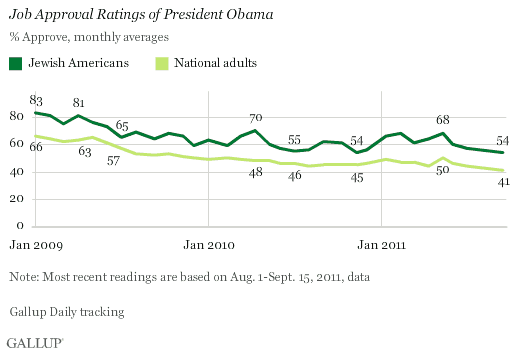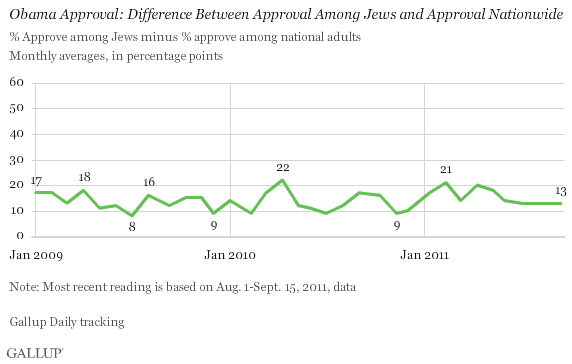PRINCETON, NJ -- There is little sign that President Obama is suffering disproportionately in support among Jews; 54% approved of his job performance from Aug. 1-Sept. 15, 13 percentage points higher than his overall 41% approval rating during that time, and similar to the average 14-point gap seen throughout Obama's term.

American Jews' support for Obama has come into question after Republican Bob Turner won a surprise special election victory in the heavily Jewish 9th Congressional District in New York. The seat was previously held by Democratic Rep. Anthony Weiner and has been reliably Democratic for decades. Some analysts suggested that Turner's victory was a result of the district's Jewish voters sending a message about their dissatisfaction with President Obama's policies.
The current findings are based on interviews with 514 Jewish Americans from Aug. 1-Sept. 15 as part of ÆéûÜǨû§Daily tracking. Although the differences between Jewish and nationwide approval of Obama differ somewhat from month to month -- partly because Jewish approval averages vary more, given smaller sample sizes averaging about 350 per month -- the patterns of both averages have generally followed each other closely. The 13-point gap between Jewish and national Obama approval ratings from early August through mid-September 2011 is essentially no different from the 14-point average across the 32 months since Obama took office.

Obama's was the lowest monthly average of his administration, but his current approval rating among Jews is not unprecedented. Jews gave Obama a 55% approval rating as long ago as July 2010, and Jewish approval reached 54% in November 2010.
Bottom Line
Although Obama's approval rating among Jewish Americans has been declining, it has generally declined no more than it has among all Americans. This calls into question attempts to link a decline in Obama's approval among Jews to his statements or policies on matters important to Jewish policymakers and lobbyists. These include and the apparent rebuke of the president in this week's special congressional election in New York, which a Republican won in a heavily Jewish district. All in all, Obama continues to do better among Jews than among all Americans, and there has been little change in that pattern so far throughout the first 2 ô§ years of his administration.
Survey Methods
Results are based on telephone interviews conducted as part of ÆéûÜǨû§Daily tracking. The monthly averages reported here span January 2009 through August 2011. Those based on national adults aged 18 and older generally include more than 15,000 interviews per month and have a maximum margin of sampling error of ôÝ1 percentage point. Results based on Jewish Americans aged 18 and older are generally based on more than 350 interviews per month, with a maximum margin of sampling error of ôÝ7 percentage points.
Results for Aug. 1-Sept. 15, 2011, polling are based on 22,479 interviews with national adults, with a maximum margin of sampling error of ôÝ1 percentage point, and on 514 interviews with Jewish Americans, with a maximum margin of sampling error of ôÝ6 percentage points.
Interviews are conducted with respondents on landline telephones and cellular phones, with interviews conducted in Spanish for respondents who are primarily Spanish-speaking. Each sample includes a minimum quota of 400 cell phone respondents and 600 landline respondents per 1,000 national adults, with additional minimum quotas among landline respondents by region. Landline telephone numbers are chosen at random among listed telephone numbers. Cell phone numbers are selected using random-digit-dial methods. Landline respondents are chosen at random within each household on the basis of which member had the most recent birthday.
Samples are weighted by gender, age, race, Hispanic ethnicity, education, region, adults in the household, and phone status (cell phone only/landline only/both, cell phone mostly, and having an unlisted landline number). Demographic weighting targets are based on the March 2010 Current Population Survey figures for the aged 18 and older non-institutionalized population living in U.S. telephone households. All reported margins of sampling error include the computed design effects for weighting and sample design.
In addition to sampling error, question wording and practical difficulties in conducting surveys can introduce error or bias into the findings of public opinion polls.
For more details on Gallup's polling methodology, visit .
